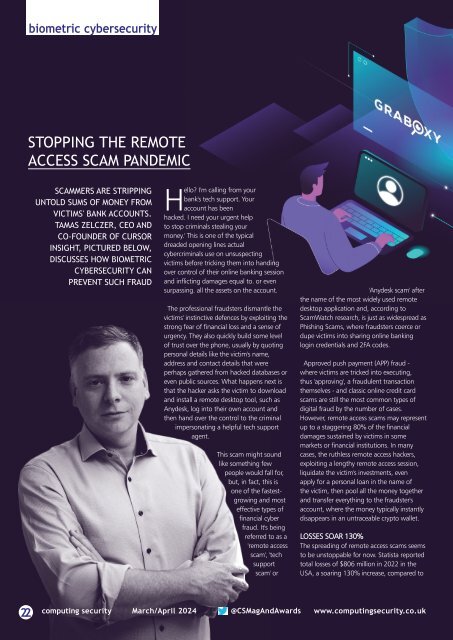CS Mar-Apr 2024
Create successful ePaper yourself
Turn your PDF publications into a flip-book with our unique Google optimized e-Paper software.
iometric cybersecurity<br />
STOPPING THE REMOTE<br />
ACCESS SCAM PANDEMIC<br />
SCAMMERS ARE STRIPPING<br />
UNTOLD SUMS OF MONEY FROM<br />
VICTIMS' BANK ACCOUNTS.<br />
TAMAS ZELCZER, CEO AND<br />
CO-FOUNDER OF CURSOR<br />
INSIGHT, PICTURED BELOW,<br />
DISCUSSES HOW BIOMETRIC<br />
CYBERSECURITY CAN<br />
PREVENT SUCH FRAUD<br />
Hello? I'm calling from your<br />
bank's tech support. Your<br />
account has been<br />
hacked. I need your urgent help<br />
to stop criminals stealing your<br />
money.' This is one of the typical<br />
dreaded opening lines actual<br />
cybercriminals use on unsuspecting<br />
victims before tricking them into handing<br />
over control of their online banking session<br />
and inflicting damages equal to. or even<br />
surpassing. all the assets on the account.<br />
The professional fraudsters dismantle the<br />
victims' instinctive defences by exploiting the<br />
strong fear of financial loss and a sense of<br />
urgency. They also quickly build some level<br />
of trust over the phone, usually by quoting<br />
personal details like the victim's name,<br />
address and contact details that were<br />
perhaps gathered from hacked databases or<br />
even public sources. What happens next is<br />
that the hacker asks the victim to download<br />
and install a remote desktop tool, such as<br />
Anydesk, log into their own account and<br />
then hand over the control to the criminal<br />
impersonating a helpful tech support<br />
agent.<br />
This scam might sound<br />
like something few<br />
people would fall for,<br />
but, in fact, this is<br />
one of the fastestgrowing<br />
and most<br />
effective types of<br />
financial cyber<br />
fraud. It's being<br />
referred to as a<br />
'remote access<br />
scam', 'tech<br />
support<br />
scam' or<br />
'Anydesk scam' after<br />
the name of the most widely used remote<br />
desktop application and, according to<br />
ScamWatch research, is just as widespread as<br />
Phishing Scams, where fraudsters coerce or<br />
dupe victims into sharing online banking<br />
login credentials and 2FA codes.<br />
Approved push payment (APP) fraud -<br />
where victims are tricked into executing,<br />
thus 'approving', a fraudulent transaction<br />
themselves - and classic online credit card<br />
scams are still the most common types of<br />
digital fraud by the number of cases.<br />
However, remote access scams may represent<br />
up to a staggering 80% of the financial<br />
damages sustained by victims in some<br />
markets or financial institutions. In many<br />
cases, the ruthless remote access hackers,<br />
exploiting a lengthy remote access session,<br />
liquidate the victim's investments, even<br />
apply for a personal loan in the name of<br />
the victim, then pool all the money together<br />
and transfer everything to the fraudster's<br />
account, where the money typically instantly<br />
disappears in an untraceable crypto wallet.<br />
LOSSES SOAR 130%<br />
The spreading of remote access scams seems<br />
to be unstoppable for now. Statista reported<br />
total losses of $806 million in 2022 in the<br />
USA, a soaring 130% increase, compared to<br />
22<br />
computing security <strong>Mar</strong>ch/<strong>Apr</strong>il <strong>2024</strong> @<strong>CS</strong>MagAndAwards www.computingsecurity.co.uk
















